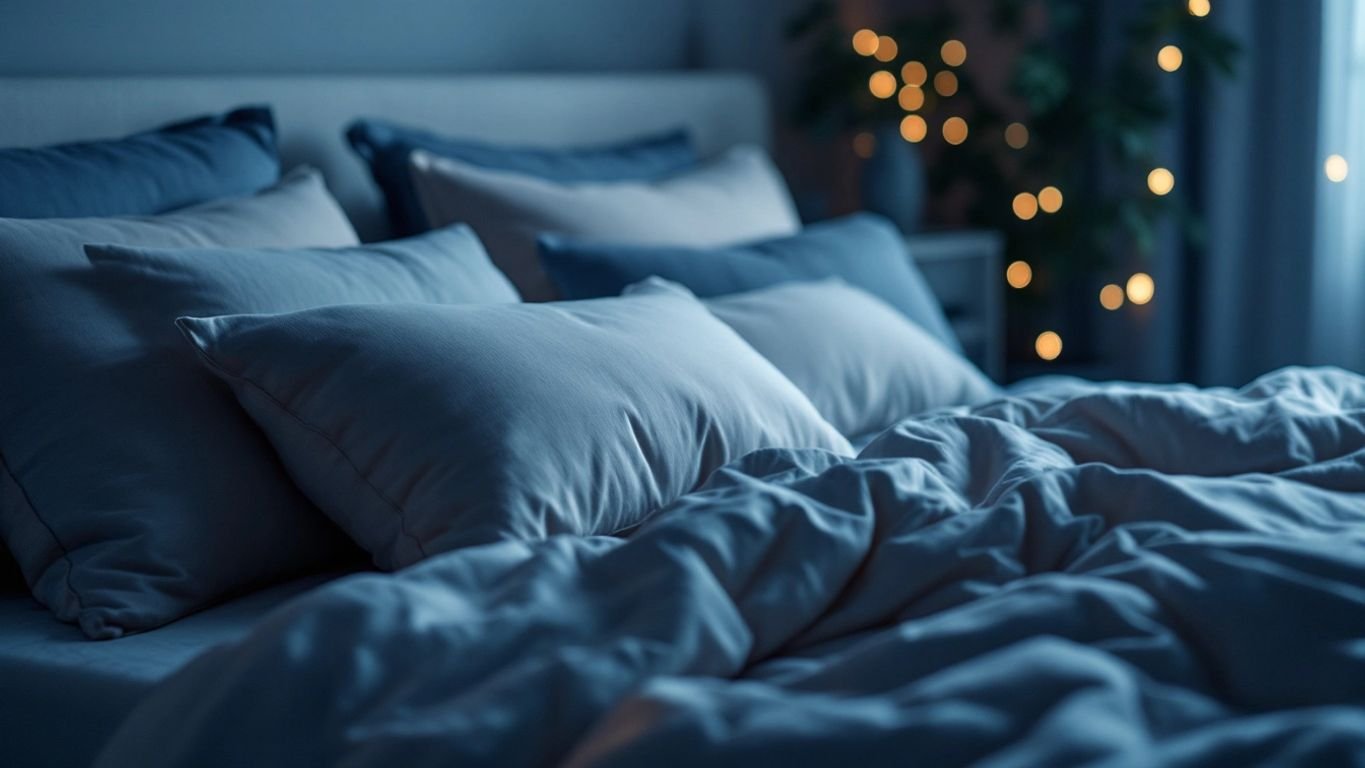
Sleep syndromes are common issues that affect many people. They can lead to serious problems like tiredness during the day and affect overall health. This guide will help you understand what sleep syndromes are, the different types, their causes, and how to treat them effectively.
Key Takeaways
- Sleep syndromes are disorders that disrupt normal sleep patterns.
- Common types include insomnia, sleep apnea, narcolepsy, and restless leg syndrome.
- Causes can be psychological, medical, or environmental.
- Recognizing symptoms like daytime drowsiness and snoring is crucial for diagnosis.
- Treatment options range from therapy and medication to lifestyle changes.
What Are Sleep Syndromes?
Defining Sleep Syndromes
So, what exactly are sleep syndromes? Well, they’re basically conditions that mess with our sleep. They can make it tough to get a good night’s rest and can lead to feeling super tired during the day. Some common types include insomnia, sleep apnea, and narcolepsy. Each of these has its own quirks, but they all share the common theme of disrupting our sleep.
Common Misconceptions
There are a few myths floating around about sleep syndromes. Here are some that I’ve come across:
- All sleep issues are the same: Nope! Each syndrome has unique symptoms and causes.
- You can just power through it: Ignoring sleep problems can lead to bigger issues down the line.
- Only adults have sleep syndromes: Kids can have them too, and they can affect their growth and learning.
Why Understanding Sleep Syndromes Matters
Understanding sleep syndromes is super important because they can impact our daily lives. If we don’t get enough sleep, it can affect our mood, concentration, and even our health. Here’s why it matters:
- Better sleep means better health: Good sleep is linked to a stronger immune system.
- Improved mood: When we sleep well, we tend to be happier and more productive.
- Increased awareness: Knowing the signs can help us seek help sooner.
Sleep is not just a luxury; it’s a necessity for a healthy life.
In short, sleep syndromes are a big deal, and understanding them can help us live better lives!
Types of Sleep Syndromes
Insomnia
Insomnia is one of the most common sleep syndromes. It’s when you have trouble falling asleep or staying asleep. It can leave you feeling exhausted and cranky. Some reasons for insomnia might include stress, anxiety, or even just a busy mind at night.
Sleep Apnea
Next up is sleep apnea. This is when your breathing stops and starts while you sleep. It can lead to loud snoring and feeling super sleepy during the day. If you or someone you know snores loudly and gasps for air, it might be time to check this out.
Narcolepsy
Narcolepsy is a bit different. It causes sudden sleep attacks during the day. Imagine just dozing off in the middle of a conversation! This can be really tough to manage, especially if it happens often.
Restless Leg Syndrome
Lastly, we have restless leg syndrome (RLS). This is when you feel an uncomfortable urge to move your legs, especially at night. It can make it hard to fall asleep or stay asleep. Many people don’t even realize they have it until they learn more about it.
Understanding these types of sleep syndromes is key to finding the right help. If you think you might have one, don’t hesitate to reach out for support!
Causes of Sleep Syndromes
Psychological Factors
When it comes to sleep syndromes, psychological factors play a huge role. Stress, anxiety, and depression can really mess with our sleep. Here are some common psychological triggers:
- Stress from work or school
- Anxiety about daily life
- Depression or mood swings
Medical Conditions
Certain medical conditions can also lead to sleep issues. For instance, sleep apnea is notorious for causing interruptions in breathing during sleep. Other conditions include:
- Restless Leg Syndrome (RLS)
- Chronic pain conditions
- Hormonal imbalances
Environmental Influences
Don’t underestimate the impact of your surroundings! Environmental factors can disrupt your sleep cycle. Some examples are:
- Noise from traffic or neighbors
- Bright lights in your bedroom
- An uncomfortable mattress or pillow
Understanding these causes is key to tackling sleep syndromes. By identifying what’s affecting your sleep, you can take steps to improve it.
In short, sleep syndromes can stem from a mix of psychological, medical, and environmental factors. It’s all about figuring out what’s going on so you can get the rest you need!
Recognizing Symptoms of Sleep Syndromes
Daytime Drowsiness
One of the first signs I notice is daytime drowsiness. If I find myself nodding off during the day, it’s a big red flag. It’s not just about feeling tired; it can really mess with my focus and energy levels.
Difficulty Falling Asleep
Then there’s the struggle with falling asleep. If I’m tossing and turning for what feels like hours, that’s definitely a symptom to pay attention to. It’s frustrating, and it can lead to a cycle of sleepless nights.
Frequent Awakenings
Another symptom is waking up frequently during the night. I might wake up feeling confused or even disoriented, which can be super annoying. Sometimes, I even experience headaches in the morning, which is just the cherry on top of a bad night’s sleep.
Snoring and Gasping for Air
Lastly, if I’m snoring or gasping for air while I sleep, that’s a serious issue. It’s not just embarrassing; it can indicate a bigger problem like sleep apnea.
Recognizing these symptoms early can make a huge difference in managing sleep syndromes. If I notice these signs, it’s time to take action and maybe even consult a professional.
By keeping an eye on these symptoms, I can better understand my sleep health and take steps to improve it.
Diagnosing Sleep Syndromes
Sleep Studies
When it comes to figuring out what’s going on with our sleep, sleep studies can be super helpful. These tests help doctors see how we sleep and what might be causing our issues. They often involve:
- Monitoring brain waves
- Checking eye movements
- Observing muscle activity
Polysomnography
One of the most common tests is called polysomnography. This fancy word just means a test that tracks various body functions while we sleep. It can help identify problems like sleep apnea, where breathing stops and starts during sleep.
Keeping a Sleep Diary
Another simple yet effective way to diagnose sleep issues is by keeping a sleep diary. This means jotting down:
- When you go to bed and wake up
- How many times you wake up during the night
- Any daytime sleepiness you feel
Keeping track of your sleep can reveal patterns that might help your doctor understand your situation better.
So, if you’re feeling off and suspect a sleep syndrome, don’t hesitate to reach out to a professional. They can guide you through these steps and help you get back to restful nights!
Treatment Options for Sleep Syndromes

When it comes to tackling sleep syndromes, there are a few paths we can take. Finding the right treatment can make a huge difference! Here’s a quick rundown of some options:
Cognitive Behavioral Therapy
- This is often the first line of defense, especially for insomnia. It helps change the way we think about sleep and develop better habits.
- It’s all about learning new skills to manage sleep issues.
Medications
- Sometimes, we might need a little extra help from sleep aids. These can be prescription or over-the-counter medications that help us get the rest we need.
- Always consult a doctor before starting any medication!
Lifestyle Changes
- Making simple changes can have a big impact. Here are a few:
- Stick to a consistent sleep schedule.
- Avoid caffeine and electronics before bed.
- Create a calming bedtime routine.
Remember, it’s important to find what works best for you. Everyone’s sleep journey is different, and sometimes it takes a bit of trial and error to find the right mix of treatments.
Sleep Hygiene Practices
- Keeping your sleep environment comfortable is key. Think about things like room temperature, noise levels, and even your mattress.
- Good sleep hygiene can help improve the quality of your sleep significantly!
Lifestyle Changes to Improve Sleep

Consistent Sleep Schedule
One of the best things I’ve done for my sleep is sticking to a consistent sleep schedule. Going to bed and waking up at the same time every day helps my body know when it’s time to rest. Trust me, it makes a huge difference!
Avoiding Stimulants
I’ve learned to steer clear of stimulants like caffeine and nicotine, especially in the afternoon. It’s also a good idea to avoid alcohol and spicy food close to bedtime. These can really mess with your sleep!
Creating a Bedtime Routine
Creating a calming bedtime routine has been a game-changer for me. Here’s what I do:
- Turn down the lights an hour before bed.
- Read a book or listen to some soft music.
- Take a warm bath to relax.
Making these small changes can really help improve your sleep quality. It’s all about finding what works for you and sticking with it!
When to Seek Professional Help

Persistent Symptoms
If you find yourself struggling with sleep issues that just won’t go away, it might be time to reach out for help. Don’t ignore the signs! If you’re having trouble falling asleep or staying asleep, or if you feel excessively tired during the day, it’s a good idea to talk to someone who knows about sleep disorders.
Impact on Daily Life
When your sleep problems start affecting your daily activities, it’s a clear signal that you should seek professional advice. Here are some signs to look out for:
- Difficulty concentrating at work or school
- Mood swings or irritability
- Trouble enjoying activities you used to love
Consulting a Sleep Specialist
If you’re experiencing any of the above, consider consulting a sleep specialist. They can help you figure out what’s going on and suggest the best treatment options for you.
Remember, getting a good night’s sleep is essential for your overall health. Don’t hesitate to seek help if you need it!
Living with Sleep Syndromes
Managing Daytime Sleepiness
Living with a sleep syndrome can be a real challenge, especially when it comes to daytime drowsiness. Here are some tips that help me cope:
- Take short naps when possible. A quick 20-minute nap can work wonders.
- Stay active. Regular exercise can boost your energy levels.
- Stay hydrated. Sometimes, just drinking water can help wake you up.
Coping Strategies
Finding ways to manage my symptoms has been key. Here are some strategies I’ve found useful:
- Set a consistent sleep schedule. Going to bed and waking up at the same time helps regulate my body clock.
- Limit screen time before bed. The blue light from screens can mess with my sleep.
- Practice relaxation techniques. Deep breathing or meditation can help calm my mind before sleep.
Support Systems
Having a support system is crucial. Here’s how I’ve built mine:
- Talk to friends and family about what I’m going through. Their understanding makes a big difference.
- Join support groups. Connecting with others who face similar challenges can be comforting.
- Consult professionals. Sometimes, talking to a therapist or a sleep specialist can provide new insights.
Living with a sleep syndrome can feel isolating, but remember, you’re not alone. Finding the right strategies and support can make a huge difference in managing your symptoms and improving your quality of life.
In summary, managing sleep syndromes is all about finding what works for you. With the right tools and support, it’s possible to lead a fulfilling life despite the challenges.
Impact of Sleep Syndromes on Health
Mental Health
Sleep syndromes can really mess with your mind. I mean, when you’re not getting enough sleep, it’s like your brain is running on empty. Here’s what I’ve noticed:
- Increased anxiety
- Higher chances of depression
- Trouble concentrating
It’s a vicious cycle! The worse you sleep, the more stressed you feel, and the more stressed you feel, the harder it is to sleep.
Physical Health
Let’s not forget about the body! Poor sleep can lead to some serious health issues. Here are a few:
- Weight gain
- Heart problems
- High blood pressure
A regular lack of sleep may lead to high blood pressure, which is no joke. It’s like your body is constantly on high alert, and that’s not good for anyone.
Quality of Life
When sleep is out of whack, everything else can feel off too. I’ve found that:
- Daily tasks become harder
- Mood swings are more frequent
- Social life can take a hit
Sleep is not just about rest; it’s about living well. If you’re struggling with sleep, it’s time to take it seriously!
Preventing Sleep Syndromes

Healthy Sleep Habits
To keep sleep syndromes at bay, I’ve found that establishing healthy sleep habits is key. Here are some tips that work for me:
- Stick to a consistent sleep schedule, even on weekends.
- Create a relaxing bedtime routine to signal to your body that it’s time to wind down.
- Make your bedroom a quiet and dark environment. If your bedroom is too noisy or too bright, do what you can to create a quiet, dark environment with adequate ventilation and humidity.
Stress Management
Managing stress is another biggie. Here’s how I tackle it:
- Practice mindfulness or meditation to calm my mind.
- Engage in regular physical activity, which helps me feel more relaxed.
- Avoid screens at least an hour before bed to reduce mental stimulation.
Regular Medical Check-Ups
Don’t forget about those check-ups! Regular visits to the doctor can help catch any underlying issues early. It’s all about being proactive about your health.
Remember, taking small steps can lead to big changes in your sleep quality. Prioritize your sleep, and your body will thank you!
To keep sleep problems at bay, it’s essential to manage stress effectively. Daily life can be overwhelming, but you don’t have to face it alone. Discover how NuviaLab Relax can help you find calm and improve your sleep quality. Visit our website to learn more and take the first step towards a more relaxed life!
Wrapping It Up: Your Sleep Matters
So, there you have it! Sleep disorders can really mess with your life, but understanding them is the first step to getting better. Whether it’s insomnia, sleep apnea, or something else, knowing the signs and causes can help you find the right treatment. Don’t forget, making some simple changes in your daily routine can also make a big difference. If you’re still struggling, it’s totally okay to reach out for help. Remember, good sleep is key to feeling your best, so take care of yourself and get the rest you deserve!
Frequently Asked Questions
What are sleep syndromes?
Sleep syndromes are problems that affect how well you sleep. They can make it hard to fall asleep, stay asleep, or feel rested after sleeping.
What are some common types of sleep syndromes?
Some common sleep syndromes include insomnia, sleep apnea, narcolepsy, and restless leg syndrome. Each one has different signs and effects.
What causes sleep syndromes?
Sleep syndromes can be caused by many things, including stress, health problems, and even the environment around you.
How can I tell if I have a sleep syndrome?
Common signs include feeling very tired during the day, having trouble falling asleep, waking up often at night, or snoring loudly.
What treatments are available for sleep syndromes?
Treatments can include therapy, medicine, and lifestyle changes like improving sleep habits and reducing stress.
When should I see a doctor about my sleep problems?
You should see a doctor if your sleep issues are lasting a long time, affecting your daily life, or if you have other health concerns.
Can lifestyle changes help with sleep syndromes?
Yes! Changes like sticking to a sleep schedule, avoiding caffeine before bed, and creating a calming bedtime routine can help improve sleep.
How do sleep syndromes affect my health?
Sleep syndromes can impact your mental and physical health, making you feel tired, moody, and less focused, which can affect your overall quality of life.
About the Author






0 Comments